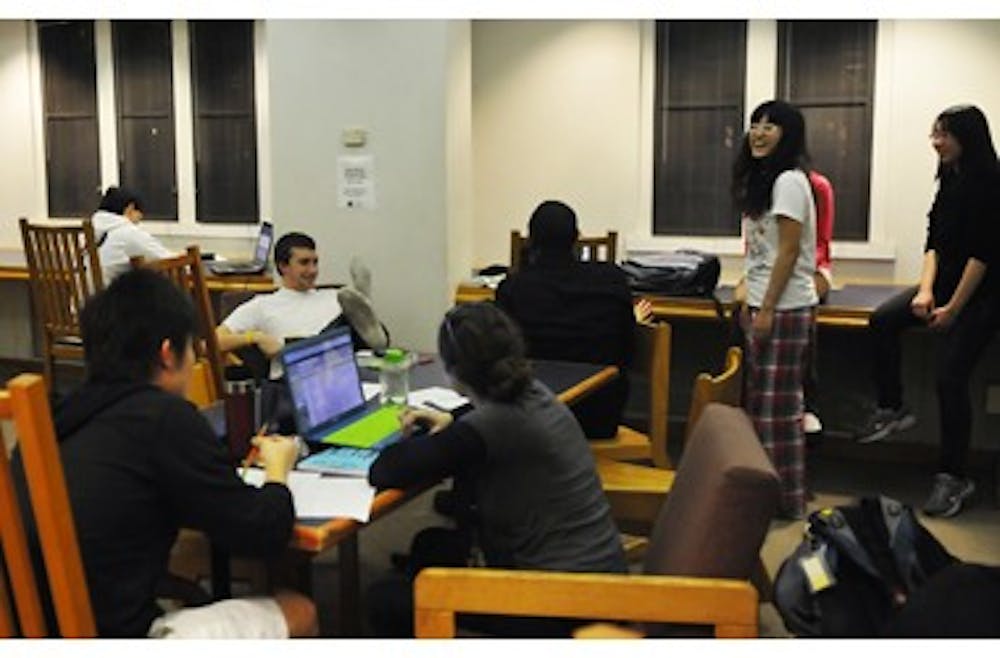
According to College freshman Katie Behrman, Penn’s new Integrated Studies Program has functioned over the past semester as “a dysfunctional yet wonderful family.”
As its title implies, the ISP program — which was launched in the fall and is now entering its second full semester — is primarily focused on academics. Through the program, about 80 College freshmen in the Benjamin Franklin Scholars program live together in Riepe College House and take a two-credit course that focuses on a variety of disciplines.
Last semester, the course — which was entitled “Identity, Inheritance and Change” — met five days per week and was taught by professors from the biology, anthropology and classical studies departments.
Looking back on last semester, ISP Director and Classical Studies professor Peter Struck said he realized that the program could not deliver a “perfect synthesis” between the various disciplines.
“What really stood out to us from the first course is that integration is absolutely worth doing, but it is not a final process,” he said.
Some students said they found the course to be engaging and exciting, but were overwhelmed by the workload.
“It felt like four credits instead of two,” said College freshman and ISP resident Igor Baran, who is currently petitioning for the course to fulfill more core requirements in the College of Arts and Sciences.
In addition to the program’s academic component, participants have formed a tight-knit community with strong personalities that are evident to students and professors alike. Struck said he has observed a “distinctive and tremendous amount of camaraderie” present among the students.
Baran agreed, adding that “through the academics, the community is reinforced. There’s a support group built in. We whine about ISP together, and we’re all there for each other.”
Last semester, one College freshman and ISP resident even created a Twitter account — called “ISPproblems” — to track what she called the “ridiculously comedic side” of the program.
The freshman — who wished to remain anonymous in order to avoid associating herself with the Twitter account — live tweets during ISP classes about the social goings-on of the program.
“Because ISP is a group of socially awkward children interacting with other socially awkward children, there are a lot of ridiculous characters and comedy” to be represented on Twitter, she said.
“It’s really like a sitcom,” Baran added. “We have the crazy uncle, the drunk aunt, the sexually active nieces and nephews and the gossiper. We all know each other’s business, and it’s like a family.”
The professors have also become part of the family, Baran said, with the Twitter account endearingly referring to the program’s director as “Papa Struck.”
“The professors have strong personalities that match up with the students,” the College freshman said.
A clear academic and social community has developed from ISP’s first semester, Struck said, and there are many goals for the program as it begins its second semester.
This semester’s ISP course is entitled “The Order of Things,” and will incorporate lectures from professors in the Physics, Comparative Literature and Political Science departments.
“I hope to engage students extensively,” said Political Science professor Rogers Smith, who will teach in the ISP program this semester. “It’s very challenging to thematically link things from three different disciplines, so we will try to structure things so that different streams genuinely inform each other.”
In the future, the program may look to make several structural and logistical changes, Struck said, but “it is too early to draw a definitive conclusion from this previous semester.”
“We are constantly tweaking but won’t be able to make large changes until the next year,” he added.
While ISP saw several students drop out last semester because of the program’s workload, “all the students in the program want to see it succeed,” Baran said.
“It’s a revolutionary concept in liberal arts education, and we are the test group,” he added. “It’s a lot, but we love it.”
The Daily Pennsylvanian is an independent, student-run newspaper. Please consider making a donation to support the coverage that shapes the University. Your generosity ensures a future of strong journalism at Penn.
DonatePlease note All comments are eligible for publication in The Daily Pennsylvanian.







